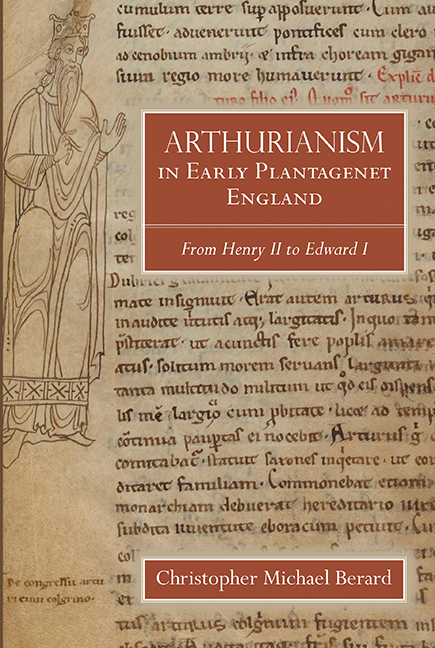Book contents
- Frontmatter
- Contents
- List of abbreviations
- Genealogical Table of the Sovereigns of England from William I to Edward II
- Introduction
- 1 Arthurianism during the reign of Henry II, 1154–1189
- 2 Arthurianism during the reign of Richard I, 1189–1199
- 3 Arthurianism during the reign of King John, 1199–1216
- 4 Arthurianism during the reign of Henry III, 1216–1272
- 5 Arthurianism during the reign of Edward I, 1272–1307
- Conclusion
- Bibliography
- Acknowledgments
- Index
- Miscellaneous Frontmatter
2 - Arthurianism during the reign of Richard I, 1189–1199
Published online by Cambridge University Press: 25 March 2020
- Frontmatter
- Contents
- List of abbreviations
- Genealogical Table of the Sovereigns of England from William I to Edward II
- Introduction
- 1 Arthurianism during the reign of Henry II, 1154–1189
- 2 Arthurianism during the reign of Richard I, 1189–1199
- 3 Arthurianism during the reign of King John, 1199–1216
- 4 Arthurianism during the reign of Henry III, 1216–1272
- 5 Arthurianism during the reign of Edward I, 1272–1307
- Conclusion
- Bibliography
- Acknowledgments
- Index
- Miscellaneous Frontmatter
Summary
Arthur of Brittany and the discovery of Arthur's bones
The competition for Arthur's legacy during Henry II's reign manifested as a contest of ideas involving rival interpretations of history and political prophecy. Was Arthur primarily a Brittonic resistance fighter or a conquering sovereign? Did Arthur die? Was he destined to return and, if so, how? As Henry's reign drew to its close, the political exploitation of the figure of Arthur in the Plantagenet world moved beyond hermeneutics in two notable ways. First, at Easter (29 March) 1187, the posthumous son of Geoffrey Plantagenet by Constance of Penthièvre, duchess of Brittany, was born at Nantes. He was christened Arthur and acclaimed the longawaited Arthurus redivivus. Second, around the year 1191, Arthur's remains were ‘discovered’ and excavated at the Benedictine abbey of Glastonbury in Somerset. Both events had major implications for the Arthurian tradition. The birth of the new Arthur, who was of Plantagenet and Breton stock, was heralded as the fulfillment of the Breton Hope. The discovery of Arthur's bones, if genuine, stood as positive proof that King Arthur had truly died, was buried, and would not rise again in fulfillment of the prophecy – at least in his original body.
These two real-life developments in the Arthurian tradition are the focus of this chapter. The genesis of these events has considerable implications for our understanding of Arthurianism in Plantagenet England. For instance, if the Crown orchestrated the Glastonbury discovery, then it is reasonable to conclude that the Plantagenet kings perceived the Breton Hope as an enduring threat to their rule. Henry II's stance in relation to the naming of his grandson Arthur is also consequential. If Henry approved of the name choice, then we are observing a heightened appropriation of King Arthur for the hegemonic interests of the Plantagenets: Henry was making his grandson the new focalization of the Breton Hope. On the basis of his lineage, Arthur of Brittany had unique potential in this regard. Not only was his maternal grandfather, Conan IV, a native duke of Brittany, his maternal grandmother, Margaret, was sister to two successive kings of Scotland: Malcolm IV (r. 1153–65) and William I (r. 1165–1214).
- Type
- Chapter
- Information
- Arthurianism in Early Plantagenet EnglandFrom Henry II to Edward I, pp. 77 - 140Publisher: Boydell & BrewerPrint publication year: 2019



